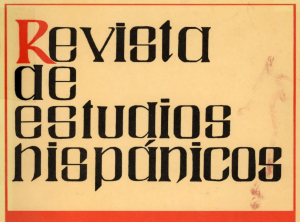Bibliografía
Artículos
Borges, “creator” of Cervantes; Cervantes precursor of Borger by Ion Agheana
La interioridad dramatica de Federico García Lorca por Antonio F. Cao
Skepticism and the problem of criteria in the Quijote by A.J. Cascardi
The Cid of Guillen de Castro: the hero as moral exemplar by James Crapotta
“Falsos paños”: lineage and dress in Gil Vicente’s don Duardos by Maria Cort Daniels
Dramaturgical distance in Valle-Inclán’s Esperpento de los cuernos de don Friolera by Dru Dougherty
Muerte y transfiguración del escritor: Borges y (en) sus lectores por Arturo Echavarría Ferrari
Argument in The celestina, and its predecessors by Charles F. Fraker
The theme of justice in Fray Luis de León’s Glosses of the Psalms by David M. Gitlitz
Feijoo and Mr. Singer: notes on The aburguesamiento of fortunata by Peter B. Goldman
Halma: the novel’s name is a game and also its frame by Leo J. Hoar, Jr.
A tradition of error: english translations of don Quijote, II, 24 by Robert M. Jackson
Story and discourse in don Quijote by Carroll B. Johnson
Two cases of klendonomancy in Lope’s theater by Sonia Jones
More on the narrator of Fortunata y Jacinta by Susan Kirkpatrick
The meaning of theater in La Desheredada by Martha G. Krow-Lucal
Sobre el signo astrologico del arcipreste de Hita por Luca López-Baralt
Camino de perfección: Baroja y el misticismo por Julio Matas
El señorito literario: antecedentes y dos casos por Gloria M. Ortiz
At the whirpool’s rim: the voice of Pedro Garfias in the generation of 1927
Is La celestina the first modern novel? by Dorothy Sherman Severin
Bestiary imagery in La celestina by George A. Shipley
Fancy and fantasy in Rosalia: signs of self and society by Alan E. Smith
Church ritual as role-playing in Hernando de Talavera’s treatise on the mass by Ronald E. Surtz
On the romancero in Paribañez: la esposa fiel and la adultera por Marsha Swislocki
Bartolome de Torres Naharro’s dialogo del nascimiento: a converso christmas play by Nora Weinerth
Authority figures in Siervo libre de amor and Grisel y Maribella by Barbara F. Weissberger
“Las aventuras de Pickwick”: notes on Benito Perez Galdos as translator of Dickens by Chad C. Wright

